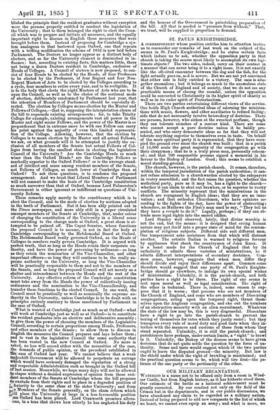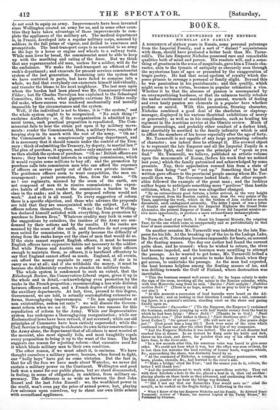OUR MILITARY RECANTATION.
WATERLOO is a name not to be effaced only from a room in Wind- sor Castle, but from English history, as it has hitherto stood there. Our estimate of the battle as a national achievement must be greatly corrected. By our conduct not only on the field of the Crimea but in the departments, and in our public discussions, we have abandoned any claim to be regarded as a military nation. Instead of being prepared to add new conquests to the list of which we boast, we cannot even equip an army ; and what is more, we do not wish to equip an army. Improvements have been invented since Wellington created an army for us, and in some other coun- tries they have taken advantage of those improvements to com- plete the appliances of the military art. The medical department is, in France, developed into a regular military corps, manned by soldiers in the full prime of vigour, and drilled to exactness and promptitude. The land-transport corps is as essential to an army as the legs to a horse or engine and wheels to a railway train. While man lives by bread, the commissariat must be able to keep up with the marching and eating of the force. But we think that any superannuated old man, useless for a soldier, will do for the ambulance. We make the land-transport an offshoot of the cook's department; and excavate for present services commissariat system of the last generation. Examining into the system that we have contrived in parts, but have failed to compose into a whole, we find that everybody can exonerate himself individually, and transfer the blame to his next neighbour. The last man upon whom the burden had been placed was Mr. Commissary-General Filder ; but Sir Charles Trevelyan has explained to the Sebastopol Committee, this week, what gigantic exertions Mr. Filder really did make, where success was rendered mechanically and morally impossible by the circumstances and the system. Well, if the individual is not to blame, it is " the system," and the whole system ought to be reorganized. " No such thing !" exclaims Authority : or, if the reorganization is admitted in ge- neral terms, each practical proposition is repudiated. The Com- missariat fails to bear the strain put upon it by military move- ments : render the Commissariat, then, a military force, capable of keeping step in its march with the rest of the army. " Oh no ! . the Commissariat is a conspicuously spending department, and it is necessary that it should remain under the control of the Trea- sury : think of submitting the Treasury, by deputy, to martial law !" The plan of purchase, it appears, makes only amateur soldiers : let us then abolish the system of purchase. " Oh no ! British officers are brave ; they have vested interests in existing commissions, which it would require some millions to buy off; and the promotion by purchase calls into commission men who can afford the expenses of officers on service partly out of their own private income." The gentlemen officers seem to want competition, the men en- couragement: permit promotion, then, from the ranks. "Oh no ! our regiments, manned by the scum of the earth, are not composed of men fit to receive commissions ; the expen- sive habits of officers render the commission a burden to the class in the ranks ; and in short, the proposed reform would not work." And so it is all round. To every suggestion of reform there is a specific objection, and those who advance the proposals are told that they are unacquainted with the subject. Let the officers reform themselves, then. " Oh no ! the Duke of Welling- ton declared himself satisfied with everything, from promotion by purchase to Brown Bess." Whatever crudity may lurk in some of the suggestions by outsiders, the insiders of the Army are con- demned by their actions and by the results. If the ranks are manned by the scum of the earth, and therefore do not comprise men suited for commissions, it is partly because the difficulty of rising from the ranks keeps out the class of men that would do so. If the state cannot support English officers, it must be because English officers have expensive habits not necessary to the soldier. But while France and Austria can afford to pay their officers enough to maintain them, as officers, it is barefaced effrontery to say that England cannot afford as much. England, at all events, can afford the money requisite to carry on war, if she is to carry on war at all; and if she withholds the money, it must be because she deliberately resolves to abandon the military trade. The whole system is condemned to such an extent, that the Edinburgh Review, the Conservative-Liberal organ, gives it up in the whole and in detail,—acknowledging even promotion by the ranks in the French proportion ; recommending a less wide division between officers and men, and a French degree of efficiency in all the auxiliary departments. At last, then, pressed to this degree, Government, we are told, is actually contemplating extensive re- forms, thoroughgoing improvements. " De non apparentibus et non existentibus, eadem est ratio" : we will discuss the Govern- ment reform when we see it. We perceive two reasons for this repudiation of reform by the Army. While our Representative system has undergone a thoroughgoing reorganization ; while our Ecclesiastical laws have been revised, if not reversed ; while our old principles of Commerce have been entirely superseded ; while the Civil Service is struggling to elaborate its own better construction— the Army alone, the department that of all others is most wanted at the moment, also most signally fails, and most haughtily repels every proposition to bring it up to the want of the time. The fact suggests one reason for rejecting reform—that excessive need for it which blinds military men to their own condition.
The other reason, if we must admit it, is ominous. We have thought ourselves a military power, because, when forced to fight, our " bully boys " have got us some victories. But the fact is, that for all the fuss we have made about Waterloo, we never did sustain a military power on the Continent. Wellington and good
lick won a name for our public places, but we stand disconnected,
in feeling, in sense of obligation, in ambition, from military su- premacy. The difference is as wide as between the first John
Russel and the last John Russell: we, the wealthiest power in the world, won't even pay the price of armed power, but, playing Jew salesman upon ourselves, try to cheat our own little armies with secondhand appliances.



























 Previous page
Previous page